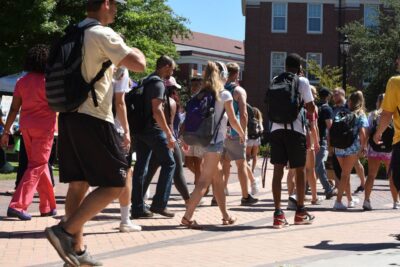Advancing access and outcomes: admissions and advising for first-generation graduate students
Robert Lyons
Director of Academic Programs & Operations, Georgetown University
The views and opinions expressed are those of the author and do not necessarily represent the views or opinions of EAB.
Over the past twelve years, I have worked for Georgetown University’s Walsh School of Foreign Service (SFS). My portfolio involves overseeing the daily operations of the Master of Arts in Asian Studies (MASIA) degree at Georgetown in coordination with the faculty, school leadership, and my counterparts who oversee the other 8+ graduate degree programs in the SFS. I chose to focus on first-generation graduate students for my EAB capstone project based on my own experience as the child of two parents who did not go to college, yet with grandparents who did go to college.
Alongside higher education colleagues, I am noticing a variety of factors in today’s environment critical to understanding the context of how to support first-generation graduate students. One notable trend is the continued robust representation of recent undergraduates in graduate student cohorts alongside their peers with years of professional experience. It is important to address impostor syndrome and to ensure student support services for graduate students regardless of age and experience. [1]
Additional needs for today’s graduate student population include:
- Ensuring English language support via the campus writing center and curriculum
- Understanding how younger generations best retain and receive information [2]
- Supporting underserved populations with access to information and support
- Leveraging campus support services in concert with one another rather than in isolation from one another
- Working with campus stakeholders to address financial needs faced by graduate degree programs
With these concerns in mind, I surveyed first-generation graduate students at Georgetown to learn more. I defined a first-generation graduate student as a graduate student whose primary caregivers did not pursue education beyond a four-year university degree. In my survey, I asked nine questions related to improving the first-generation graduate admissions and advising experience.
Some of the takeaways from submitted responses included: helping students better understand and access information they need for campus support services, outlining ways to outreach to prospective first-generation graduate students via first-generation student associations at college campuses, and requesting more transparency in terms of financial aid, affordability, and demystifying graduate education.
-
Interested in the Rising Higher Education Leaders Fellowship?
Thinking about the next steps, it is also critical to think about the challenges involved in fully meeting the needs of first-generation graduate students. One concern is affordability. Many of these students are surprised to see that master’s programs follow a merit-based scholarship model rather than the needs-based scholarship model that is common for undergraduate programs. A second concern is staffing. Universities do a great job with benefits and quality of life, yet many prospective student-facing staff note the higher salaries of some other sectors.
Third, leaders face significant fiscal challenges with the competing needs of undergraduate programs that may be capped in terms of enrollment due to housing/town-gown relations and master’s programs that generate revenue yet may require more financial investment than forecasted. Lastly, faculty, who invest in teaching and mentoring students, are also constrained in their time with research, service, and personal obligations.
All these challenges are critical to think about because they guide me on what solutions can be immediately addressed whereas other solutions will need further assessment and assistance over the long term. Proposed near-term solutions include a First-Generation Graduate Student Outreach Initiative for admissions officers and academic program management; leveraging campus resources to ensure 24-7 advising resources are available for students; and partnering with the Division of Student Affairs and the SFS Career Center to extract data from student belonging surveys and career surveys to address the needs of first-generation graduate students.
While much more can be accomplished, the near-term and long-term goals are to improve the graduate student experience for all, including for first-generation students.
References
[1] EAB. Student Belonging for Adult Learners. Washington, DC: EAB, 2023.
[2] EAB. Marketing Evolution for Adult Learners. Washington, DC: EAB, 2023.
More Blogs

A winning platform for higher education in a high-scrutiny era

Five trends that give community colleges a surprising edge in 2026
